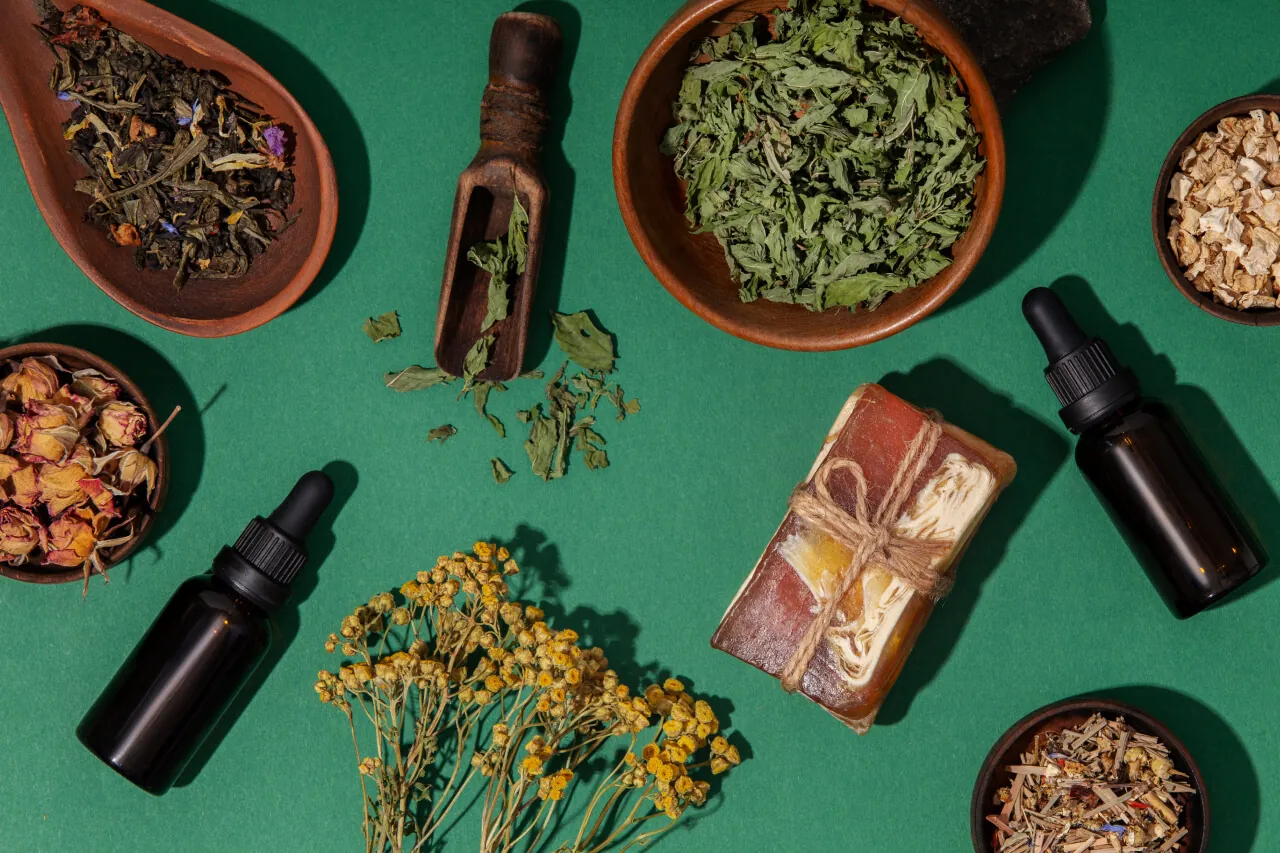Did you know your grandma’s garden might hold the key to soothing your sore knees?
Does knee pain have you longing for the carefree days of your youth or even an adult who suffers as well? You’re not alone. Millions of people suffer from knee pain, often caused by injuries, arthritis, or simply wear and tear.
While prescription medications and physical therapy offer relief, many turn to natural remedies for a gentler approach. Let’s explore the different types of knee pain, discover 9 powerful herbal remedies straight from nature’s bounty, and answer your burning questions about natural knee pain management.
What are the types of knee pain?
Knee pain can stem from various causes, each requiring a tailored approach to treatment. From acute injuries to chronic conditions like knee osteoarthritis and rheumatoid arthritis, understanding the underlying cause of your knee pain is crucial for effective management.
9 Herbal Remedies for Knee Pain
- Turmeric: Renowned for its potent anti-inflammatory properties, turmeric is a staple in herbal medicine for alleviating knee pain. Curcumin, the active compound in turmeric, helps reduce swelling and stiffness associated with knee arthritis.
- Ginger: With its natural analgesic and anti-inflammatory properties, ginger offers you a relief from knee pain by reducing your inflammation and improving joint mobility. So incorporating fresh ginger into your diet or enjoy it as a soothing herbal tea!
- Boswellia: Also known as Indian frankincense, boswellia extract has shown promising results in relieving knee pain and improving joint function. Its anti-inflammatory properties make it a valuable addition to your herbal remedy arsenal. Boswellia formulations was statistically significantly more effective than placebo for pain relief and functional improvement.
- Devil’s Claw: Native to Africa, devil’s claw is a potent herbal remedy for knee pain, particularly in cases of osteoarthritis. Its analgesic and anti-inflammatory effects help alleviate discomfort and improve mobility.
- Willow Bark: Derived from the bark of the white willow tree, willow bark contains salicin, a compound with pain-relieving and anti-inflammatory properties similar to aspirin. Incorporate willow bark extract into your regimen for natural relief from knee pain.
- Arnica: Widely used in homeopathic medicine, arnica is prized for its ability to reduce pain, swelling, and bruising associated with knee injuries. Apply arnica gel topically to soothe sore muscles and joints.
- Stinging Nettle: Despite its prickly reputation, stinging nettle offers relief from knee pain and inflammation. Rich in vitamins and minerals, nettle tea or supplements can help alleviate symptoms of arthritis and promote joint health.
- Cat’s Claw: Native to the Amazon rainforest, cat’s claw is revered for its immune-boosting and anti-inflammatory properties. Incorporate cat’s claw supplements into your routine to reduce knee pain and support overall joint health.
- Eucalyptus: Known for its cooling sensation and analgesic properties, eucalyptus oil can provide temporary relief from knee pain when applied topically. Dilute eucalyptus oil with a carrier oil and massage it into the affected area for soothing relief.
How to Ease Knee Pain and Swelling
In addition to herbal remedies we stated before, incorporating lifestyle modifications and self-care practices can further alleviate knee pain and swelling. Here are some tips to help you manage your symptoms effectively:
- Practice tai chi: This gentle form of exercise improves balance, flexibility, and strength, making it an ideal low-impact activity for individuals with knee pain.
- Apply hot or cold therapy: Alternating between hot and cold packs can help reduce inflammation and alleviate pain. Apply a cold compress for acute injuries, and use heat therapy for chronic conditions like arthritis.
- Maintain a healthy weight: Excess weight puts added stress on your knees, exacerbating pain and inflammation. Adopting a balanced diet and engaging in regular exercise can help you achieve and maintain a healthy weight, reducing strain on your joints.
- Supportive footwear: Invest in supportive footwear with cushioning and shock absorption to reduce impact on your knees during daily activities.
Which of them is the best herb for knee pain?
While each herb offers unique benefits for relieving knee pain, the best choice depends on your individual symptoms and preferences.
Some individuals may find turmeric or ginger particularly effective due to their potent anti-inflammatory properties, while others may prefer the soothing effects of eucalyptus oil or arnica gel. Experiment with different herbal remedies to find the one that works best for you, and consult with a healthcare professional for personalized recommendations.
How can I lubricate my knees naturally?
To naturally lubricate your knees and promote joint health, incorporate foods rich in omega-3 fatty acids, such as salmon, flaxseeds, and walnuts, into your diet. Omega-3 fatty acids help reduce inflammation and improve joint function, keeping your knees supple and flexible. Additionally, staying hydrated by drinking plenty of water throughout the day can help maintain the synovial fluid that lubricates your joints, reducing friction and discomfort.
What Herbs Help with Arthritis?
Several herbs have been shown to be beneficial for alleviating symptoms of arthritis, including turmeric, ginger, boswellia, devil’s claw, and willow bark. These herbs offer anti-inflammatory and analgesic properties that can help reduce pain, swelling, and stiffness associated with arthritis. Incorporate these herbs into your daily routine through dietary sources, herbal supplements, or topical preparations to support joint health and improve your quality of life.
How to manage knee pain at work and home?
Managing knee pain at work and home requires a multi-faceted approach that combines herbal remedies with ergonomic adjustments and self-care practices. Here are some tips to help you navigate daily activities with greater ease and comfort:
- Maintain good posture: Whether sitting at a desk or standing for long periods, proper posture is essential for reducing strain on your knees and supporting spinal alignment.
- Take regular breaks: Incorporate short breaks throughout the day to stretch your legs, change positions, and alleviate pressure on your knees.
- Use supportive equipment: Invest in ergonomic office furniture, such as an adjustable chair and keyboard tray, to promote proper posture and reduce strain on your knees and back.
- Practice mindful movement: Engage in gentle exercises like tai chi or yoga to improve flexibility, strengthen supporting muscles, and reduce tension in your knees.
- Prioritize self-care: Incorporate stress-reducing activities like meditation, deep breathing exercises, and aromatherapy into your daily routine to promote relaxation and alleviate knee pain.
Summary
Incorporating herbal remedies into your knee pain management regimen can provide natural and effective relief from discomfort, inflammation, and stiffness. From turmeric and ginger to boswellia and devil’s claw, Grandma’s garden offers a wealth of botanical solutions tailored to ease your symptoms and improve your quality of life.
By combining herbal remedies with lifestyle modifications and self-care practices, you can empower yourself to take control of your knee health and enjoy greater mobility and comfort in your daily life. Remember to consult with a healthcare professional before starting any new treatment regimen, especially if you have underlying medical conditions or are taking medications. Take the first step towards relief today and embrace the healing power of nature’s pharmacy for your knees.
FAQs
What are herbal remedies for knee pain?
Herbal remedies for knee pain are natural solutions derived from plants and botanicals, such as turmeric, ginger, boswellia, and devil’s claw. These remedies are known for their anti-inflammatory, analgesic, and antioxidant properties, which can help alleviate discomfort and improve joint mobility.
Are herbal remedies safe for managing knee pain?
When used correctly and under the guidance of a healthcare professional, herbal remedies can be safe and effective for managing knee pain. However, it’s essential to consult with a medical professional before starting any new treatment regimen, especially if you have underlying health conditions or are taking medications.
How do herbal remedies compare to conventional treatments for knee pain?
Herbal remedies offer a natural alternative to conventional treatments for knee pain, such as nonsteroidal anti-inflammatory drugs (NSAIDs) or corticosteroid injections. While both approaches can provide relief, herbal remedies are often preferred for their gentler nature and fewer potential side effects.
Can herbal remedies help with chronic knee conditions like osteoarthritis and rheumatoid arthritis?
Yes, herbal remedies have shown promise in managing chronic knee conditions like osteoarthritis and rheumatoid arthritis. Ingredients like turmeric, ginger, and boswellia have anti-inflammatory properties that can help reduce pain, swelling, and stiffness associated with these conditions.
How long does it take to see results from using herbal remedies for knee pain?
The time it takes to see results from herbal remedies for knee pain can vary depending on the individual, the severity of the condition, and the chosen remedy.





